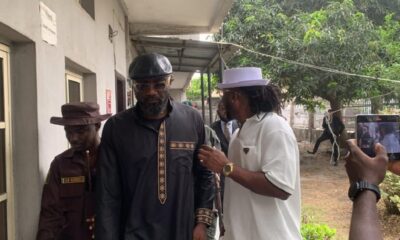News
Trump fails at Apex Court to stop hush money sentencing

By Kayode Sanni-Arewa
The United States Supreme Court on Thursday denied a last-minute bid by President-elect Donald Trump to halt sentencing in his hush money case.
The top court, which includes three justices appointed by Trump, rejected his emergency application seeking to block Friday’s sentencing by a 5-4 vote.
The court, in a brief unsigned order, said the “burden that sentencing will impose on the President-Elect’s responsibilities is relatively insubstantial” and noted that Trump will be allowed to attend virtually.
The court also noted that the judge who presided over the hush money case has already said he plans to impose a sentence of “unconditional discharge,” which does not carry any jail time, fine or probation.
Trump is scheduled to be sentenced in Manhattan at 9:30 am (1430 GMT) on Friday after being convicted by a New York jury in May of 34 counts of falsifying business records to cover up a hush money payment to porn star Stormy Daniels.
Trump, 78, who is to be sworn in as president on January 20, filed an emergency application with the Supreme Court on Wednesday seeking to halt his sentencing.
Four justices — Clarence Thomas, Samuel Alito, Neil Gorsuch and Brett Kavanaugh, all conservatives — were in favor of granting Trump’s request to halt his sentencing.
Chief Justice John Roberts and Justice Amy Coney Barrett, also conservatives, joined the three liberal justices in rejecting the president-elect’s bid.
Barrett, Gorsuch and Kavanaugh were appointed by Trump.
Trump’s lawyers made several legal maneuvers in an effort to fend off sentencing arguing that it would be a “grave injustice” and harm “the institution of the presidency and the operations of the federal government.”
Trump’s attorneys also claimed that the immunity from prosecution granted to a sitting president should be extended to a president-elect.
Manhattan District Attorney Alvin Bragg rejected their arguments in his response on Thursday, saying Trump was a private citizen when he was “charged, tried, and convicted.”
– Convicted felon –
Bragg also said the Supreme Court “lacks jurisdiction over a state court’s management of an ongoing criminal trial” and preventing sentencing would be an “extraordinary step” by the top court.
“There is no basis for such intervention,” Bragg said.
In the order, the Supreme Court said Trump can still appeal his conviction through the New York state courts.
Judge Juan Merchan said last week he was leaning towards giving Trump an unconditional discharge that would not carry jail time, a fine or probation. He also agreed to allow Trump to attend Friday’s Manhattan sentencing virtually instead of in person.
Trump is the first former US president to be convicted of a crime and will be the first convicted felon to serve in the White House.
Trump potentially faced up to four years in prison, but legal experts — even before he won the November presidential election — did not expect Merchan to incarcerate him.
Trump was certified as the winner of the 2024 presidential election on Monday, four years after his supporters rioted at the US Capitol as he sought to overturn his 2020 defeat.
AFP
News
A Chat with Janet Odio Okolo: A Mother’s Journey Raising a Child with Down Syndrome

News
Hon. Nnamchi Begins Street Lights Deployment In Isi Uzo(Photos)

Honourable Paul Sunday Nnamchi, representing Enugu East/Isi Uzo Federal Constituency in the 10th House of Representatives, has fulfilled his promise to illuminate communities in Isi Uzo Local Government Area.
The lawmaker has just begun the deployment of high-density solar-powered street lights in Ikem Nkwo, marking the beginning of a massive rollout of the street lamps across the communities in Isi Uzo.
This initiative, which started in Enugu East Local Government Area in 2024, aims to support the fight against insecurity in the state which according to him was to add to what Chief Security Officer of Enugu State Barrister Peter Mba had done to secure the state to attracts foreign investments.
The lawmaker expressed concern over banditry attacks, particularly by herdsmen, in some communities within Isi Uzo and Enugu East Local Government Areas in the recent pasts.
He believes that illuminating these areas with high-density street lights would help address the insecurity adding that he was prioritizing border and farming communities in Isi Uzo, where banditry has displaced residents and restricted farming activities.
Communities in Ikem, Eha-Amufu in Isi Uzo which borders Enugu and Benue State and Ugwogo-Nike in Enugu East have been vulnerable to these attacks due to their strategic locations.
News
May Day: Kalu Hails Workers, Applauds Their Role in Nation Building

By Gloria Ikibah
Deputy Speaker of the House of Representatives, Rep. Benjamin Kalu, has extended warm wishes to Nigerian workers as the country marks the 2025 edition of International Workers’ Day.
Kalu praised workers across various sectors for their commitment and resilience, describing them as the engine that keeps the nation moving. He acknowledged their sacrifices and unrelenting drive, especially during tough economic times.
In his message, he highlighted the efforts of the current administration under President Bola Tinubu to improve the welfare of public servants. He referenced the National Assembly’s prompt backing of the new minimum wage as a sign of the government’s seriousness about workers’ wellbeing.
The Deputy Speaker appealed for continued patience and understanding from Nigerians, noting that the ongoing economic reforms, while challenging, are designed to bring long-term relief and prosperity.
Kalu also called for unity, and said the country can only overcome its present difficulties if citizens and leaders work together in good faith.
He therefore urged workers to keep the faith and remain steadfast in their duties, assuring them that brighter days are on the horizon, and wished Nigerian workers a peaceful and fulfilling May Day celebration.
-

 Metro16 hours ago
Metro16 hours agoGunmen storm University of Benin teaching hospital, kill doctor
-

 Metro17 hours ago
Metro17 hours agoFCTA destroys 601 motorbikes over violations
-

 News8 hours ago
News8 hours agoAlleged money laundering: EFCC produces Aisha Achimugu in court
-

 News17 hours ago
News17 hours agoJust in: FG declares tomorrow public holiday
-

 News10 hours ago
News10 hours agoJUST IN: Major General Paul Ufuoma Omu Rtd, dies at 84
-

 News12 hours ago
News12 hours agoSAD! Professor’s son takes own life inside varsity staff quarters
-

 News10 hours ago
News10 hours agoTinubu hails Dangote’s World Bank appointment
-

 News16 hours ago
News16 hours agoFull list: FG approves N110bn to rehabilitate medical schools 18 institutions























